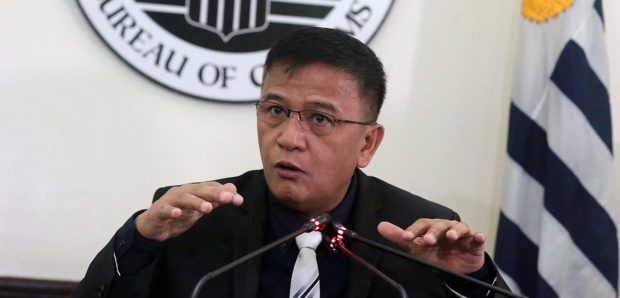There was gross negligence on the part of resigned Bureau of Customs (BOC) chief Nicanor Faeldon after the agency failed to prevent the entry of the P6.4 billion worth of shabu shipment from China into the country, the Senate blue ribbon committee concluded in its report.
The panel recommended the filing of criminal charges against Faeldon and five other BOC officials, namely Deputy Commissioner Gerardo Gambala, ex-Intelligence Service chief Neil Estrella, Intelligence Officer Joel Pinawin, and ex-Import Assessment Services (IAS) director Milo Maestrecampo as they were culpable for misfeasance and non-feasance in the performance of their functions.
They could face charges in violation of some provisions of the Customs Modernization and Tariff Act (Republic Act 10683) and Anti-Graft and Corrupt Practices Act (Republic Act 3019), according to the report obtained by the Inquirer.
Based on the draft committee report, Faeldon’s imposition of a “military structure” within the agency “was good, but the concomitant diligence and competence was sorely lacking.”
“We, therefore, hold him responsible,” it said.
The draft committee report is still for approval among members of the panel as of posting. Majority of the panel must first affix their signature of confirmation to the report before it is reported to the Senate plenary where all senators would decide either to adopt or reject it.
Faeldon is currently detained within the Senate premises after the committee held him in contempt for deliberately skipping the hearings.
Senator Panfilo Lacson, who is also a member of the blue ribbon committee, in a recent privilege speech bared that Faeldon had been receiving bribe money while at the helm of the BOC, including the P100 million “pasalubong” on his first days in office.
Lacson, citing different intelligence sources, also revealed that Gambala, Estrella, Maestrecampo and other BOC officials has also received “tara” or grease money.
Faeldon and the other officials involved all denied benefitting from the tara system in the BOC.
Citing the existing tara system in the BOC, the committee “strongly recommended and urged in the strongest terms that the BOC be totally overhauled.”
“In its investigation, the committee has unraveled the intricacies and extent of the ‘Tara System’. And the reason why BOC collection cannot meet its collection target is because of benchmarking that is currently being set by the ‘players’ in their favor,” it said.
“The ‘Tara System’, as discovered by this committee, must be utterly dismantled and never allowed to come into existence again,” the report added.
The Senate panel said the BOC should study the feasibility of conducting pre-shipment inspection, from the port of origin to the port of destination.
The issuance of alert order must also be decentralized, said the committee. An alert order is issued to hold the release of a questionable shipment.
“The power may be given to specific officials but there must be an immediate report if there is an increase of collection or not due to the execution of alert orders; regular reports of alert orders issued, and its status, must be submitted to the Secretary of Finance and a proposed Congressional Oversight Committee,” it said.
To professionalize the BOC, the committee also recommended that the majority of deputy commissioners be career officers of the bureaucracy.
The committee likewise recommended the formation of a public-private partnership to help monitor, on a monthly basis, the compliance of the BOC of its target and on the implementation of the attrition law.
“The attrition law must be fully implemented fully and faithfully. Since 2008, the law has not been implemented. It shows how government performance has been lackadaisical. If the law had been properly implemented, the employees at the BOC could have enjoyed for themselves a windfall in the billions of pesos after reaching their target of about P620 billion,” it said. /kga
